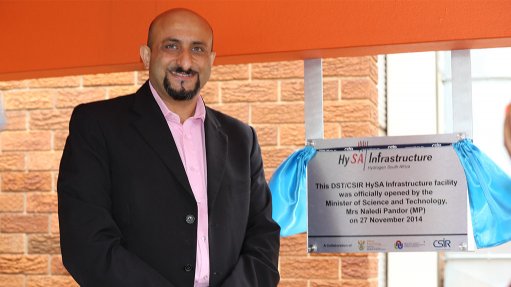
IMRAAN PATEL Using hydrogen as an energy carrier, combined with fuel cell technology, has attracted considerable interest from government, international bodies and commercial companies worldwide
As part of government's response to the global challenge of energy security, its hydrogen and fuel cell technologies programme – Hydrogen South Africa (HySA) – and the Council for Scientific and Industrial Research’s (CSIR’s) Batteries Research Centre aim to develop new types of materials to meet challenging hydrogen energy-storage requirements.
This research and development (R&D) will be conducted at a suite of laboratories dedicated to hydrogen research at the CSIR, in Pretoria. The Department of Science and Technology (DST) launched the laboratories in November last year.
“Amid the global movement towards developing sustainable energy systems and reducing greenhouse gas emissions, the use of hydrogen as an energy carrier, combined with fuel cell technology, has attracted considerable interest from government, international bodies and commercial companies worldwide,” DST deputy director-general for socioeconomic innovation partnerships Imraan Patel says.
Fuel cells that use a precious metals group catalyst, like platinum, use hydrogen, which has little or no polluting emissions, as chemical energy is converted into electrical energy, he explains.
Patel says hydrogen is touted as a future clean and efficient fuel. “The challenge is to develop infrastructure to produce, store and make hydrogen available for these applications, in addition to getting cheaper replacement catalysts.”
Batteries Programme
HySA was established through the National Hydrogen and Fuel Cells Technologies Research, Development and Innovation Strategy, which was developed by the DST in 2006 and implemented as a 15-year programme.
It consists of three centres of competence, namely HySA Infrastructure, which focuses on hydrogen production, storage and delivery; HySA Catalysis; and HySA Systems, which coordinates the DST’s battery key programme with the CSIR. The battery key programme focuses on producing lithium-ion batteries for stationary and mobile applications.
The HySA Infrastructure Centre of Competence is cohosted by the CSIR and North-West University. The battery project is coordinated from the University of the Western Cape’s HySA Systems hub with the collaboration of the CSIR, the University of Limpopo and the Nelson Mandela Metropolitan University, in the Eastern Cape.
Patel adds that the vision of the HySA strategy is to establish new technology-intensive industries through the creation of intellectual property pertaining to the use of minerals that are indigenous to South Africa, especially platinum-group metals.
“This will help the country create a new fuel cell industry, and create wealth as well as jobs. The batteries will further benefit the country through the beneficiation of local raw materials, such as manganese and titanium,” he says.